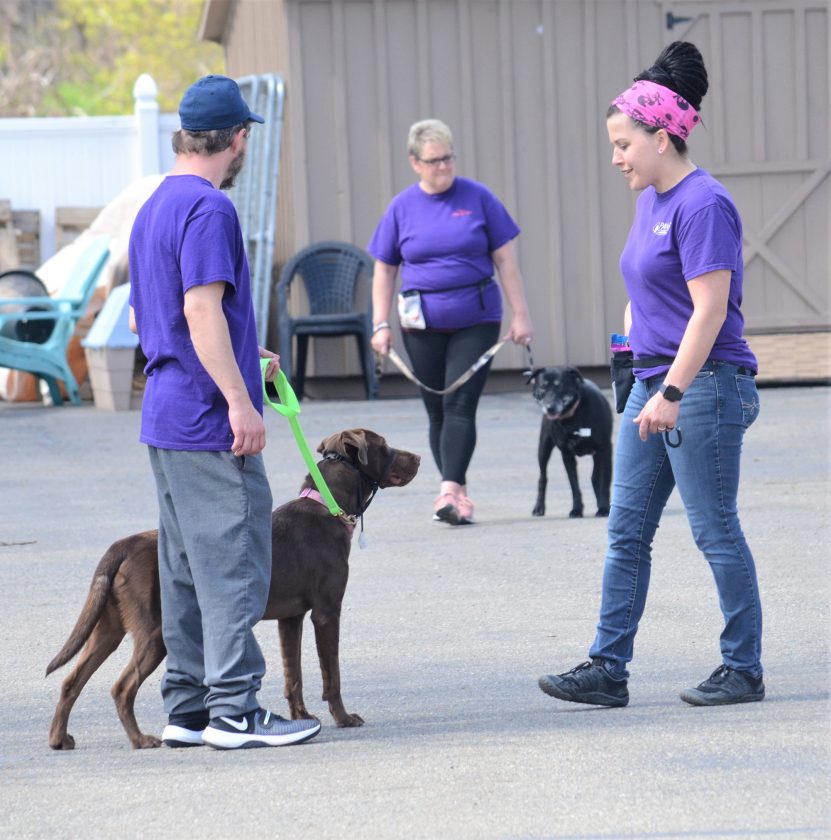On The Right Path
Training helps prepare dogs for new homes
- Times Observer photos by Brian Ferry Above, Paws Along the River Humane Society staffer Pauleen Cochran moves in to give Brandy, held by Rich Jordan, a reward, for not reacting to a nearby stimulus, Celine, held by Michele Bova, during a recent training for staff, volunteers, and dogs. Below, Professional Certified Dog Trainer Kris Hopkins holds Jellybean and instructs Paws Along the River Humane Society staffer Pauleen Cochran in using pressure to correct reactivity.
- Times Observer photo by Brian Ferry Paws Along the River Humane Society staffer Hannah Baxter rewards Jellybean, held by Pauleen Cochran, for not reacting to a nearby stimulus during a recent training for staff, volunteers, and dogs.

Times Observer photos by Brian Ferry Above, Paws Along the River Humane Society staffer Pauleen Cochran moves in to give Brandy, held by Rich Jordan, a reward, for not reacting to a nearby stimulus, Celine, held by Michele Bova, during a recent training for staff, volunteers, and dogs. Below, Professional Certified Dog Trainer Kris Hopkins holds Jellybean and instructs Paws Along the River Humane Society staffer Pauleen Cochran in using pressure to correct reactivity.
Some of the animals brought to Paws Along the River Humane Society have been through a lot.
Staff and volunteers are going through ongoing training on how prepare those animals for new homes — and to keep safe while doing it.
On Tuesday, Humane Society staff and volunteers attended a training on how to deal with a reactive dog. Reactions to their environment may include barking, lunging, and growling.
The attendees were taught practices for recognizing and handling such trouble areas as resource guarding and fear and anxiety. The course included information about dog body language, arousal levels, and marker training.
Certified Professional Dog Trainer — Knowledge Assessed Kris Hopkins led the training.

“Body language always outranks verbal” for dogs, she said. “We talk a lot. It’s easier and better received by the dog to use your body.”
An example from resource guarding was standing facing the dog, between it and the resource – hot dogs in the sample — and pressuring the dog with contact from the handler’s legs.
She stressed that the pressure had to be removed when the dog “deferred” to the pressure and helped the attendees recognize several different deferments.
“Pressure on, see your deferment, pressure off,” she said. “It’s a conversation.”
Keeping the pressure on only stresses the dog.

Times Observer photo by Brian Ferry Paws Along the River Humane Society staffer Hannah Baxter rewards Jellybean, held by Pauleen Cochran, for not reacting to a nearby stimulus during a recent training for staff, volunteers, and dogs.
The staff and volunteers were able to practice the techniques with some of their animals.
Some dogs at Paws were tested for reactivity with toy dogs — and rewarded when they did not react. Later, outside, dogs were tested with other, “neutral” dogs not far away.
A rescue brought dozens of reactive dogs to the humane society in 2019.
Those dogs are doing well and several have been adopted out. But the incident revealed the need for more advanced training.
Paws personnel first met Hopkins after a family in central Pennsylvania adopted a dog from Paws. The dog was having trouble adjusting. Hopkins helped and became a contact and a resource for the humane society.
The training was one of six recently at Paws.
“We’re all trying to learn more and do better,” Executive Director Karen Kolos said. “We’re not just here to clean kennels and feed dogs and cats. We’re here to rehabilitate – rescue, rehabilitate, and match for life.”
“We want to offer people the opportunity to have pets and have them be part of the family,” Kolos said.
They also want to help provide peace-of-mind for those who, for whatever reasons, can’t keep their pets.
When people move and can’t or don’t take their pets with them, that stresses the animal.
“We want people to know that we have the knowledge and the education to get animals ready for a new home,” she said. “We really want to be there for people who don’t know what to do.”






